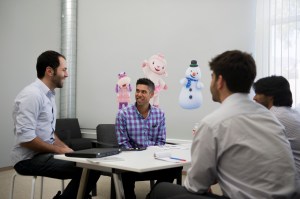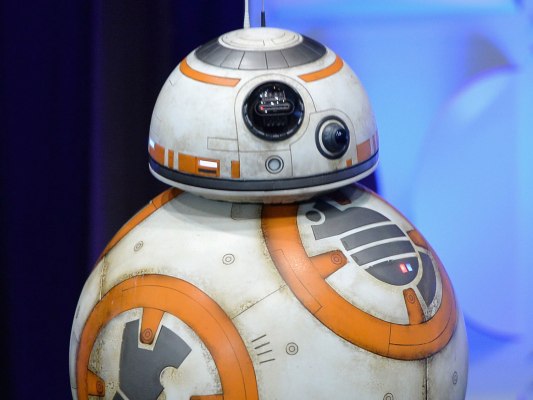The Walt Disney Co. is kicking off the third session of its corporate accelerator this week, and revealed 9 new companies admitted to the program. A full list follows at the end of this post.
The companies are developing everything from cinematic virtual reality and holographic content, to robots with human-like facial expressions.
Because alumni of the Disney Accelerator have scored big partnerships with the media and entertainment juggernaut in the past, it is seen as one of the more desirable corporate accelerators out there.
According to research by Future Asia Ventures, there are 131 active corporate accelerators worldwide today, with 13 new programs launching in the first half of 2016. The U.S. has the most with 31 accelerators, representing plenty of competition for dealflow.
Alumni of the Disney Accelerator include Sphero, which created the BB-8 droid Star Wars toy, a best seller for Disney in 2015; and StatMuse, the sports data platform that now provides Disney-owned ESPN with statistical content.
This marks the first year that Disney will be running its accelerator fully in-house without relying on TechStars, the outside partner that helped it get the program off the ground in 2014. Some changes are at hand, accordingly.

Disney Accelerator Mentor Ryan Spoon (Sr VP Product Management) meets with Disney Accelerator 2015 group.
The Walt Disney Company’s Senior Vice President of Innovation, Michael Abrams, said that this year, one team participating in the Disney Accelerator is actually an internal project team, not a startup.
Other participants span from seed- or very early-stage companies to those that have already raised a significant amount of funding and generated millions in revenue.
In the past, Disney Accelerator admitted early stage businesses only and did not include in-house teams. It also applied one-size-fits-all deal terms to all 10 admitted companies. Deals will now be negotiated ad hoc, Abrams confirmed.
“The program has evolved. But we’ve always been very media and entertainment oriented, obviously. What we can do better than other accelerators is to help [entrepreneurs] learn and refine the art of storytelling by working with some of the world’s best creatives, and help them understand the various business segments within media and entertainment from advertising to theme parks,” he said.
Disney often connects startups in its accelerator with operating units of the Walt Disney Co., broadly, so they can pilot projects together or forge partnerships of another kind.
Of the most recent applicant pool, Abrams reported an increase in AI and robotics startups, compared to previous years, and a drop in the number of companies working with GIFs.
The companies selected for the 2016 Disney Accelerator include:
- Ader – a marketplace connecting brands with eSports and gaming influencers. The company’s network of influencers reaches over 50 million monthly viewers. Ader has raised $125,000 in seed funding.
- Atom Tickets – is a mobile movie ticketing app where customers can buy movie tickets, pre-order concessions, invite friends without having to pay for them, easily discover new movies, browse trailers, read reviews, and plan their next night out at the movies. Atom Tickets has raised $50 million in venture funding.
- Hanson Robotics – a creator of human-like robots with a full range of facial expressions. Based in Hong Kong, Hanson Robotics is building a range of robots for the business and consumer markets. The videos of its robot “Sophia” have been viewed more than one billion times.
- Jaunt VR – a developer of hardware, software, tools and applications that enable cinematic virtual reality content creation. Jaunt has raised $100 million in venture funding.
- littleBits – a platform of easy-to-use electronic building blocks that empowers kids to invent anything, from a remote-controlled car to a dancing robot to a smart home device. littleBits was founded by Ayah Bdeir, Co-Founder of the Open Hardware Summit, a TED Senior Fellow and a graduate of the MIT Media Lab. LittleBits has raised $60 million in funding.
- Nom – an online live streaming video community for chefs and food lovers. Nom users can create, share, watch, and participate in live videos while chatting and interacting with each other. Nom was founded by Vijay Karunamurthy, former YouTube engineering lead, and Steve Chen, Co-Founder and CTO of YouTube.
- OTOY – A holographic content platform bringing light field rendering and network streaming to virtual reality and augmented reality experiences.
- Playbuzz – a content-creation and audience-engagement platform that helps tens of thousands of publishers, marketers, bloggers and brands to create engaging content using mobile-friendly formats that are optimized for social sharing. With offices in New York and Tel Aviv, Playbuzz has raised $31 million in funding.
- Pley – a toy subscription company. For a monthly fee, members receive their preferred toys from a catalog of at least 500 toys shipped directly to their door and can play with, keep or return each toy whenever they wish. Pley has raised more than $16 million in venture funding.
